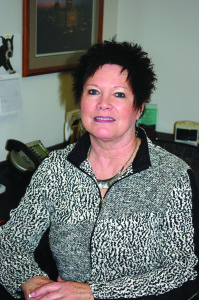Four tips on how to best obtain financing for your small business

Sabetha Mumm just had a baby when she realized she had to leave the job she was working.
Working in an office did not fit the dream she had of working in dance. She had been a dancer throughout her youth and in college and obtained a dance degree from Iowa. She’d been unable to continue dancing after college because there weren’t any dance academies in the state. She had tried to stay involved by working for dance studios and with gymnasts but had another full-time job to make ends meet.
“After I had my son, I (asked myself) how I can raise him and say, ‘Do what you love,’ when I wasn’t,” Mumm recalls.
She told her husband she needed to follow her dreams. In 2003, she applied for her first small business bank loan, which she received to start her dance teaching business, Dance Vision.
Only about 66 percent of small businesses will survive their first year, according to the U.S. Small Business Administration, an independent agency of the federal government that works to aid, counsel and assist small businesses. About half will survive the first five years.
That’s why Bruce Whited, vice president of commercial banking at Bank Iowa in Johnston, wants to make sure prospective business owners have the experience and the capital to ensure they have the best chance at being successful.
“The last thing I want to do is feed into that,” Whited says of small business failures.
A small business loan can be the key for many entrepreneurs to start their business, expand their existing one, or even cover day-to-day expenses such as payroll, inventory or new equipment purchases. Important steps must be taken to make a loan possible, as prospective entrepreneurs will certainly face potential barriers and roadblocks.
Experts agree that the better prepared an entrepreneur is, the better chance he or she has at getting approved for a small business loan.
Here are several steps to consider:
1. Do your homework
Business owners need to consider why they want the loan and whether it will help them start or expand their business. Lenders will want to know the reason behind obtaining the loan.
The first order of business is for an entrepreneur to meet with an attorney and an accountant or tax consultant, and do his or her own research to create a business plan, says Diane Harmening, vice president of City State Bank in Grimes.
“You have to have a plan to know what you’re doing and where you’re headed,” she says. “A lot of times, that first meeting is informational.”
Specifically, banks and lenders want to know who will bring money to the table, whether investors are involved, how much capital and cash the business owner has to put toward the project, and how they will pay back the money. A personal financial contribution from the business owner shows commitment, Harmening says.
“They’ll work a little harder because they’ve got some money in to it,” she says.
But overall, Harmening says, “The more prepared they are, the more of a feeling we get as to how serious they are.”
Mumm was nervous to apply for a business loan, but she was prepared. She researched for six months and read all of the small business loan information she could find. She had her paperwork pre-completed, had gathered her personal financial information and had created a business plan.
“I had done all of my research,” Mumm says. “You don’t just walk through the door and say, ‘Hey, I’ve got this idea. I need some money.’ ”
A start-up business owner will need information about the corporate structure of the business, the business location, the products and services it will offer, background about the industry, and information about his or her own personal experience within the industry. Three years of financial history including personal tax returns for the business owner and all investors is also typically required.
“We get a lot of folks I’ve seen over the years that want to open a restaurant or bar,” says Whited with Bank Iowa. “Our first questions is, ‘What’s your experience been working in a restaurant or bar?’ ”
If the person previously worked as a server for less than a year, he or she might want to consider another option or gain more experience.
“They need a solid business plan backed with some industry experience more than anything else,” Whited says. “That’s what I’m looking for.”
The business plan also should include realistic projections such as a three- to six-year outlook for potential clients, projected sales, and income and expenses.
If the business owner is looking to expand, he or she would need to present a bank officer with monthly financial statements to show income and expenses, business and personal tax returns and bank statements, major customers and supplies, information about contracts or franchises, how they plan to expand the business, business legal documents such as articles of incorporation, as well as how much equity the individual has in the business. A certified public accountant can help put together this information.
Once the business owner has a plan and financial information in order, he or she will meet with a banker or lender who can help determine what type of business loan will be best based on his or her needs, as well as how to compare the cost and terms of each loan. Lenders will want to compare the annual percentage rates and ensure the borrower will be able to make the loan’s regular payments.
2. Know your financial obligation

Most banks and lenders will require business owners to put up some of their own collateral or have investors to help front part of the cost of starting or expanding the business.
Mumm saved her own money but used her entire small business loan to start her business. She first went to a larger bank for her loan. She says the lender told her she was well prepared but couldn’t give her the loan because the bank did not work with small business owners. Mumm then went to a smaller bank and received a loan.
She recently applied for and received another business loan in order to assist with a fourth expansion of her business, which will be construction of a new building so she can become the owner of her own property. She has no investors for the project, and the required 10 percent down payment is her own equity.
This time, Mumm met with four banks and presented them with financial statements to show the consistent growth of her business along with future growth projections. She ended up working with a local bank that will give her a $1.86 million loan in partnership with the Small Business Administration.
Mumm’s business has grown from a 100-foot-by-24-foot bay in a strip mall with 100 students and herself as the only teacher to a 7,000-square-foot space with 320 students and 11 teachers. The new building will be completed mid-year and will bring another six positions to the business.
The amount of equity or money that is needed for a down payment will vary depending on regulatory requirements and the type of loan. Some require 25 percent; others a minimum of 10 percent or even zero down.
Harmening says if the business owner is having difficulty putting down or matching 20 percent of the business’ worth, he or she should look to recruit more investors to help finance the start-up or expansion.
Whited says a lot of beginning entrepreneurs have fewer financial resources to get started, which makes him question how they will pay for daily operations. That, combined with a limited amount of experience, is likely to result in being turned down for a loan.
“The last thing I want to do as a commercial lender is set anybody up to fail,” he says.
3. Seek alternative sources of money

Business owners can also obtain loans through the U.S. Small Business Administration, which provides general small-business loans that range from $5,000 to $5 million. The average loan amount is $371,000.
According to the SBA website, government small business loans can be more ideal for those who don’t have a strong credit report or financial history. These loans will require the borrower to follow guidelines regarding repayment and the interest rate set by the government. The interest rate for government loans is usually lower than those in the private sector.
SBA loans are typically offered through partnering banks or credit unions. These loans can be used for the purchase of new equipment, supplies or machinery; to finance leasehold improvements; for the commercial mortgage on buildings; to refinance existing debt; or to establish a line of credit.
Small businesses can benefit from an SBA loan because it provides money and capital the owner may not have. The loans also provide less risk to the bank because the loan is backed by the SBA, meaning it will be repaid by the government even if the business owner defaults, according to the SBA website.
Mumm’s combination bank/SBA loan was one of 19 loans valued at almost $12.3 million received in 2016 through Iowa Business Growth, a local certified development company that administers the government loan program to provide alternative financing resources to businesses.
Most businesses that apply and receive a loan are planning an expansion or want to buy a piece of equipment, says Steve Cruse, vice president of Iowa Business Growth.
Through these loans, called 504 loans, business owners are responsible for 10 percent of the loan amount. SBA contributes 40 percent and the bank 50 percent. About 95 percent of loans are for real estate, or a real estate/equipment combined loan for 10 to 20 years.
SBA loans through the Iowa Business Growth office are a minimum of $50,000, meaning a $130,000 project. The average project size is a little more than $1 million, with IBG’s average contribution being about $500,000.
Most of these loans are for the expansion of an existing business, Cruse says, with the occasional start-up loan.
Entrepreneurs in small towns might also consider contacting their local city or county government to learn about potential resources that can help provide incentives for those who are light on initial investment or capital.
Business owners might be required to clean up their personal finances before applying for a loan. Credit reports are one tool lenders will use to determine a borrower’s credibility. Illness, divorce or other personal circumstances can damage an individual’s finances. If the borrower has been negligent in paying back debts, he or she might have trouble receiving a future loan.
A history of bad credit may result in the need to seek a nontraditional financing option that is less dependent upon credit score. This can include nonprofit micro-lenders and online lenders that offer lines of credit and accounts receivable financing.
4. Develop more experience; take more time to become independent

If a business owner is turned down for a loan, there might be other options he or she can take, experts say.
An asset-based lender might be willing to offer a loan, but the rates are usually higher than a traditional bank.
A new entrepreneur could also try to find physical space for his or her business through an incubator space. A business incubator is a company that helps new and start-up companies by offering services such as management training or office space during new businesses early months or initial years. It usually provides affordable office space and services, marketing support and sometimes access to types of financing.
Whited says this can be a good move for a new business owner who might need a service such as information technology support but can’t afford it on their own.
“Some of those incubators have done some pretty good things for folks who are starting up,” he says.
Harmening says if the business owner is turned down for a loan, he or she could consider developing more experience within the industry by working for another business that is similar to the one he or she wants to start.
“If you’re brand new and starting this with no talent and no experience in the business, we’re going to look really hard at that,” she says. ♦


superbeets review
I know this if off topic but I’m looking into starting my own weblog and was curious what all is required to get setup? I’m assuming having a blog like yours would cost a pretty penny? I’m not very internet smart so I’m not 100% sure. Any recommendations or advice would be greatly appreciated. Many thanks|